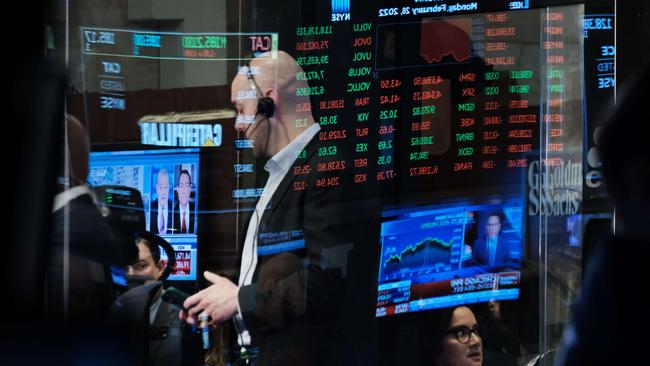US positioned to withstand economic shock from Ukraine crisis
Fallout could push US inflation higher from already elevated levels, but economic expansion appears to be on solid ground.

As Russian President Vladimir Putin launched a war against Ukraine, half a world away the US economy appeared to be rebounding from a winter surge of Covid-19 infections.
A range of US data suggests US economic activity picked up in recent weeks. Many Wall Street analysts expect the Labor Department on Friday to report large job gains in February and a further decline in unemployment.
These developments suggest that the US is in a position to withstand the economic shock that might emanate from battlegrounds in Ukraine. Those effects could push US inflation higher from already elevated levels, but the economic expansion appears to be on solid ground.
“It looks like the US has gotten through the Omicron variant and weathered that storm and the economy is growing solidly,” said Mickey Levy, chief US economist at Berenberg Capital Markets, the securities arm of a German bank.
Much could change in the days or weeks ahead. If fighting intensifies or spreads to other countries, or if sanctions and Russian reprisals to sanctions deepen, the effects could hit the US economy harder.
But for now, Mr Levy has been watching weekly signs of rising US consumer spending and output in February. OpenTable, the online restaurant reservation business, reports that US restaurant seating broke 6 per cent above pre-pandemic levels in February after slumping earlier this year.
STR, a research firm that tracks hotel trends, said occupancy at US lodgings hit 59 per cent in mid-February, up from 50 per cent early in the month and 45 per cent during the same period a year earlier.
Meantime, the Transportation Security Administration said airport checkpoint counts hit 2.15 million in late February, compared with 1.54 million at the end of January and 1.19 million at the same time a year earlier.
Mr Levy said these are important developments because they suggest resurging life in the services side of the economy, which has been hit hardest by pandemic-driven disruptions.
US Covid-19 cases and hospitalisation dropped substantially in February and deaths have fallen in recent weeks with a lag.
In all, consumer spending in the first half of February was up 7.2 per cent from a year earlier, compared with a 2.7 per cent increase in the first two weeks of January, according to data from Earnest Research, which tracks credit- and debit-card purchases.
Economists at Citigroup estimate the Labor Department will report Friday that US payrolls grew by more than 500,000 in February and the jobless rate fell to 3.8 per cent. Morgan Stanley estimates payrolls grew 730,000 in February and the jobless rate dropped to 3.7 per cent. In 2021, monthly payroll increases averaged 555,000. In the decade before the pandemic, monthly increases of around 150,000 to 200,000 were more normal.
The US economy is exposed to Russia and Ukraine mostly through energy channels. Russia is a major supplier of oil and gas supplies to the globe – especially Europe – and also supplies commodities such as potash and palladium that are important components of goods including fertiliser and catalytic converters for cars. The war and the Western financial sanctions resulting from it have disrupted supplies and pushed up prices for these and other commodities, worsening global inflation.
However analysts so far aren’t forecasting a big hit to US economic growth from these effects. Chris Varvares, head of US economics at IHS Markit, an economic advisory firm, estimates higher oil prices will shave 0.4 percentage point from the US growth rate in 2022, to 2.5 per cent for 2022 from its pre-war forecast of 2.9 per cent, and have almost no effect in 2023 and 2024.
Moody’s Analytics, another economic advisory firm, estimates a sustained move of oil prices up to $US100 ($A137.82) a barrel would slightly sap US consumer spending in other markets, but not in a highly disruptive way. It estimates a shock of this kind would shave just 0.2 percentage point off the US growth rate in 2022. The firm has already lowered its growth forecast to 3.5 per cent this year, from its forecast of 3.7 per cent before the war, said Mark Zandi, its chief economist.
“The impact of the Russian invasion on the US economy will be on the margins,” Mr Zandi said in a written assessment of the impact of an oil price spike.
One risk is that higher US inflation provokes the Federal Reserve to raise interest rates aggressively, which could hit growth by restraining domestic investment and spending through more costly borrowing. Fed officials have been telegraphing for weeks that they plan to raise short-term rates in March. If inflation accelerates or persists, Fed officials might feel forced to lift rates more than otherwise.
At the same time, Russia isn’t a dominant player in the global economy outside of certain commodities markets. It produces about $US1.5 trillion annually in goods and services, less than countries including India, South Korea and Italy.
Its economic output is about equal to that of Iowa, North Dakota, South Dakota, Kansas, Minnesota, Missouri and Nebraska, combined. Excluding Russia’s energy sector, its economy is more like the combined size of those states minus Missouri. Texas’s economy is nearly 25 per cent larger than Russia’s.
Financial markets are another channel through which shocks can be transmitted from one place to another. In the late 1990s, the collapse of the Russian rouble contributed to global financial disruptions that sent a cascade of developing economies into recession and roiled US markets.
So far that kind of contagion doesn’t appear to be taking place. Stock indexes in Brazil and Argentina, for example, are up 8 per cent and 5 per cent, respectively, so far this year. Stocks in Thailand are up 2 per cent so far this year and they are up 5 per cent in Indonesia and 4 per cent in Singapore.
Mr Levy said US bond markets also are functioning normally, unlike March 2020, when Covid-19 hit and froze US Treasury bond transactions, or 2008, when mortgage securities’ values tumbled and squeezed the health of many banks.
“Nothing jumps out to me that suggests unhinged stability,” Mr Levy said. “You have more volatility but you don’t see dysfunction. You see a normal, predictable flight to quality.” Yields on 10-year US Treasury notes have fallen from near 2 per cent at midmonth to below 1.9 per cent since the Russian invasion. Lower US yields aid domestic activity by supporting US mortgage markets and domestic corporate borrowing.
Of course, the effects could worsen. For example, if energy supply shortages drive Europe into recession, then a shock to its banks or consumers could spread more widely to the US and other countries.
But other reverberations might benefit the US. Rig counts at US drillers for gas and oil have been rising, and at a faster pace in recent weeks, according to Baker Hughes, the drilling supplier. Higher rig counts are an indicator of more domestic energy investment. In late February, rig counts were up 62 per cent from a year earlier, greater than an annual change of 59 per cent in late January. Rising oil and gas prices could give producers more incentive to drill in the US despite a domestic push against carbon-based energy sources.
Chevron and Exxon Mobil have said they plan to increase spending this year in the US Permian Basin, an area of the Southwest where shale wells produce rapidly, giving the companies flexibility to respond to higher prices. But the two oil companies and smaller drillers have said they plan to be conservative about ploughing too much back into wells at a time when the nation is pushing in another direction.
The Wall Street Journal


